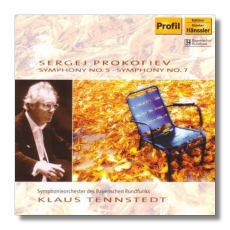
The Internet's Premier Classical Music Source
Related Links
- Prokofieff Reviews
- Latest Reviews
- More Reviews
-
By Composer
-
Collections
DVD & Blu-ray
Books
Concert Reviews
Articles/Interviews
Software
Audio
Search Amazon
Recommended Links
Site News
 CD Review
CD Review
Serge Prokofieff

- Symphony #5 in B Flat Major, Op. 100
- Symphony #7 in C Sharp minor, Op. 131
Bavarian Radio Symphony Orchestra/Klaus Tennstedt
Profil PH05003
Tennstedt delivers a knock-out performance of the Prokofieff Fifth, one of the finest ever to appear on silver or vinyl. The first movement is powerful, full of tension, the epic character of the music coming across with a majestic sweep, all in vivid, potent sound that, surprising, comes from 1977. The Scherzo is especially spirited, the outer sections dark and malicious and the colorful trio building from the jauntily suave to the good-naturedly rowdy. The Adagio third movement is passionate and dark, the outer portions lovely and heartrending, the central panel threatening, with evil not just lurking around the corner, but turning around the corner and coming directly at you. The finale is breathless, full of wit and joyful spirit, but also brusque and hearty in its colorful celebrations.
All in all, this is a magnificent Prokofieff Fifth that must rank with my favorites: Bernstein/New York Philharmonic, Weller/London Symphony, and Levi/Atlanta Symphony. A curious note: if you look at the timings on the back cover of the enclosed booklet or on your CD player, you'll notice the third movement comes in at a somewhat leisurely timing of 14:13 and the finale at an incredibly fleet 8:13, but the Adagio isn't particularly slow and the finale, though brisk enough, is not unusually fast. The reason behind this puzzling state of affairs? Someone at Profil grafted the slow opening of the finale, which gloomily recalls the main theme from the first movement, onto the ending of the third movement, shifting about a minute-and-a-half to the wrong track.
The Seventh Symphony, a better work than it is often assessed to be, also receives a fine performance. It is a bit more muscular here than usual, coming across with almost the same epic spirit of the Fifth. Yet, Tennstedt manages to highlight the darker character of the work too, catching both the menace of the Scherzo and the unsettling nature of the finale's close. By the way, he wisely opts for the quiet ending (which is not so quiet here), a choice most appropriate to his interpretive stance. Again, the sound is powerful and vivid.
The late Klaus Tennstedt was known for his insightful readings in the Germanic repertory, but he scores a resounding triumph here, leaving one to wonder that he should have done more Prokofieff (his only other recording was of the Lieutenant Kijé Suite) and more of the Russian repertory in general. This recording is a must for those interested in 20th-Century music and especially the music of Prokofieff. Highest recommendations!
Copyright © 2005, Robert Cummings




















